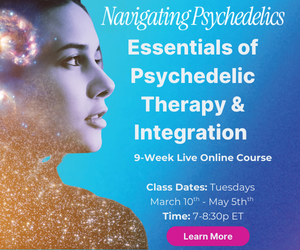Download
Daniel Pinchbeck, author of the new book, How Soon is Now? joins us this week to talk about the global ecological crisis, climate change, and how psychedelics may play a role in transforming human culture.
If you do believe that we are in a time of great ecological crisis, what are you doing about it? Taking action is the most important step to creating change, but are we willing to take the sacrifices and action to create change?
Daniel shares his insights about how to take action to implement change. While some of these changes may be challenging, i.e., stop traveling as much, it may be necessary to help cut carbon emissions and to slow down the global warming cycle. Or is it too late to even take action?
A recent journal article, “Lifetime experience with (classic) psychedelics predicts pro-environmental behavior through an increase in nature relatedness” states:
Our model controlled for experiences with other classes of psychoactive substances (cannabis, dissociatives, empathogens, popular legal drugs) as well as common personality traits that usually predict drug consumption and/or nature relatedness (openness to experience, conscientiousness, conservatism). Although correlational in nature, results suggest that lifetime experience with psychedelics in particular may indeed contribute to people’s pro-environmental behavior by changing their self-construal in terms of an incorporation of the natural world, regardless of core personality traits or general propensity to consume mind-altering substances. Thereby, the present research adds to the contemporary literature on the beneficial effects of psychedelic substance use on mental wellbeing, hinting at a novel area for future research investigating their potentially positive effects on a societal level.
About How Soon is Now?
Description of his book from Amazon.com
We are on the brink of an ecological mega-crisis, threatening the future of life on earth, and our actions over the next few years may well determine the destiny of our descendants. Between a manifesto and a tactical plan of action, How Soon is Now? by radical futurist and philosopher Daniel Pinchbeck, outlines a vision for a mass social movement that will address this crisis.
Drawing on extensive research, Daniel Pinchbeck presents a compelling argument for the need for change on a global basis. The central thesis is that humanity has unconsciously self-willed ecological catastrophe to bring about a transcendence of our current condition. We are facing an initiatory ordeal on a planetary scale. We can understand that this initiation is necessary for us to evolve from one state of being – our current level of consciousness – to the next. Overcoming outmoded ideologies, we will realize ourselves as one unified being, a planetary super-organism in a symbiotic relationship with the Earth’s ecology and the entire web of life.
Covering everything from energy and agriculture, to culture, politics, media and ideology, How Soon Is Now? is ultimately about the nature of the human soul and the future of our current world. Pinchbeck calls for an intentional redesign of our current systems, transforming unjust and elitist structures into participatory, democratic, and inclusive ones. His viewpoint integrates indigenous design principles and Eastern metaphysics with social ecology and radical political thought in a new synthesis.
 Show Notes/Links
Show Notes/Links
- Daniel’s Website
- Daniel’s Writing & Projects
- Evolver
- Reality Sandwich
- Age of Aquarius
- Burning Man
- Bobby Klein – Breathwork in Tulum, MX
Daniel’s Books



 Check out more of Daniel’s writing: Here
Check out more of Daniel’s writing: Here
About Daniel Pinchbeck

From Daniel Pinchbeck’s Website
I am the author of Breaking Open the Head (Broadway Books, 2002), 2012: The Return of Quetzalcoatl (Tarcher/Penguin, 2006), Notes from the Edge Times(Tarcher/Penguin, 2010), and How Soon Is Now (Watkins, 2017). I co-founded the web magazine, Reality Sandwich, and Evolver.net, and edited the publishing imprint, Evolver Editions, with North Atlantic Books. I was featured in the 2010 documentary, 2012: Time for Change, directed by Joao Amorim and produced by Mangusta Films. I founded the think tank, Center for Planetary Culture, which produced the Regenerative Society Wiki. I hosted the talk show Mindshift on GaiamTV. My essays and articles have been featured in The New York Times Magazine, Esquire, Rolling Stone, ArtForum, The New York Times Book Review, The Village Voice, Dazed & Confused, and many other publications.
Check out our upcoming course, Navigating Psychedelics
Learn about harm reduction practices, self-care, and ways to integration your experience




